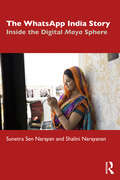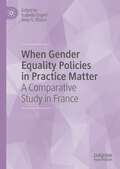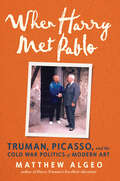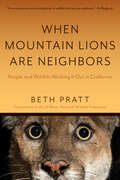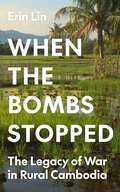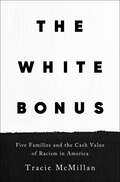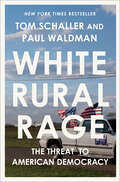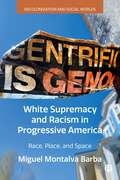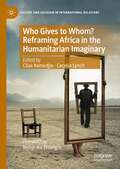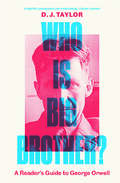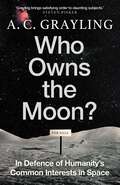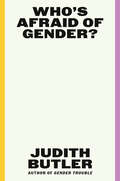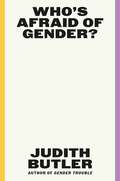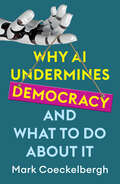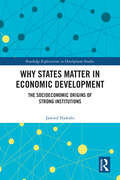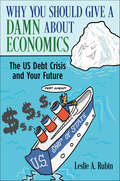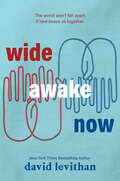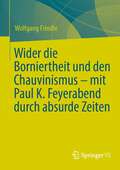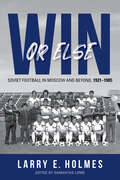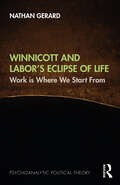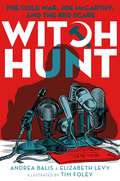- Table View
- List View
The WhatsApp India Story: Inside the Digital Maya Sphere
by Sunetra Sen Narayan Shalini NarayananWhatsApp is used by over half a billion people in India today in all fields – in business, corporate and informal sectors, in government, for education and among friends, families and acquaintances. This book critically explores the social messaging app’s rapid expansion in India and its growing influence and looks at whether, as a form of horizontal communication, it poses a challenge to more traditional structures of communication. The book examines WhatsApp’s spread in the personal and professional lives of Indians and the myriad ways in which people in India are using the app in social and business interactions, including among people living with disabilities. Using case studies, interviews, surveys and in-depth research, it analyses key aspects of WhatsApp’s massive popularity and its impact on how people communicate. It also explores its impact on the psycho-social dynamics in India, including the dissemination of fake news and politically motivated content, and the consequent need for media regulation in the country. One of the first books to analyse the pervasiveness of WhatsApp and social media apps in different areas of Indian society, this book will be of interest to scholars and students of media studies, communication studies, digital media, cultural studies, cyberculture studies, sociology and social policy and media law.
When Gender Equality Policies in Practice Matter: A Comparative Study in France
by Isabelle Engeli Amy G. MazurThis book analyses gender equality policy implementation in France. Presenting seven detailed case studies through a common comparative framework by leading experts on French gender policy, it sheds light on if, how, and under what conditions gender equality policy in practice leads to success, overall gender transformation, and enhanced gender equality in democratic settings. The book contributes to ongoing comparative research that focuses on the post adoption phases of implementation and evaluation and seeks to develop accurate recipes for gender equality policy success. It will appeal to all those interested in gender studies, comparative politics and public policy, and policy implementation.
When Harry Met Pablo: Truman, Picasso, and the Cold War Politics of Modern Art
by Matthew AlgeoTruman and Picasso were contemporaries and were both shaped by and shapers of the great events of the twentieth century—the man who painted Guernica and the man who authorized the use of atomic bombs against civilians. But in most ways, they couldn't have been more different. Picasso was a communist, and probably the only thing Harry Truman hated more than communists was modern art. Picasso was an indifferent father, a womanizer, and a millionaire. Truman was utterly devoted to his family and, despite his fame, far from a rich man. How did they come to be shaking hands in front of Picasso's studio in the south of France? Truman's meeting with Picasso was quietly arranged by Alfred H. Barr Jr., the founding director of New York's Museum of Modern Art and an early champion of Picasso. Barr knew that if he could convince these two ideological antipodes, the straight-talking politician from Missouri and the Cubist painter from MÁlaga, to simply shake hands, it would send a powerful message, not just to reactionary Republicans pushing McCarthyism at home, but to the whole world: modern art was not evil. Truman author Matthew Algeo retraced the Trumans' Mediterranean vacation and visited the places they went with Picasso, including Picasso's villa, Picasso's ceramics studio in Vallauris, and ChÂteau Grimaldi, a museum in Antibes.A rigorous history with a heartwarming center, When Harry Met Pablo intertwines the biographies of Truman and Picasso, the history of modern art, and twentieth-century American politics, but at its core it is the touching story of two old men who meet for the first time and realize they have more in common—and are more alike—than they ever imagined.
When Mountain Lions Are Neighbors: People and Wildlife Working It Out in California (With a New Preface)
by Beth PrattNow updated with a new preface: a full-color celebration of coexistence with California's iconic wildlife.Wildness beats in the heart of California's urban areas, and across the state Californians are taking action to recast wildlife as an integral part of our everyday lives. In Los Angeles, residents rallied to build one of the largest wildlife crossings in the world because of the plight of one lonely mountain lion named P-22. Porpoises cavort in San Francisco Bay again because of a grassroots effort to clean up a waterway that was once a toxic mess. Yosemite's park staff and millions of visitors have mobilized to keep its famed bears wild. And after a near century-long absence, Californians are welcoming wolves back to the state, inspired by the remarkable journey of the wolf OR-7. When Mountain Lions Are Neighbors explores this evolving dynamic between humans and animals. Now updated with a new preface, these inspiring stories celebrate a new model for wildlife conservation: coexistence.
When the Bombs Stopped: The Legacy of War in Rural Cambodia (Princeton Studies in International History and Politics #206)
by Erin LinHow undetonated bombs from a war that ended more than fifty years ago still affect Cambodian farmers and their land Over the course of the Vietnam War, the United States dropped 500,000 tons of bombs over Cambodia—more than the combined weight of every man, woman, and child in the country. What began as a secret CIA infiltration of Laos eventually expanded into Cambodia and escalated into a nine-year war over the Ho Chi Minh trail fought primarily with bombs. Fifty years after the last sortie, residents of rural Cambodia are still coping with the unexploded ordnance that covers their land. In When the Bombs Stopped, Erin Lin investigates the consequences of the US bombing campaign across postconflict Cambodia.Drawing on interviews, original econometric analysis, and extensive fieldwork, Lin upends the usual scholarly perspective on the war and its aftermath, presenting the viewpoint of those who suffered the bombing rather than those who dropped the bombs. She shows that Cambodian farmers stay at a subsistence level because much of their land is too dangerous to cultivate—and yet, paradoxically, the same bombs that endanger and impoverish farming communities also protect them, deterring predatory elites from grabbing and commodifying their land. Lin argues that the half-century legacy of American bombs has sedimented the war into the layers of contemporary Cambodian society. Policies aimed at developing or modernizing Cambodia, whether economic liberalization or authoritarian consolidation, must be realized in an environment haunted by the violence of the past. As the stories Lin captures show, the bombing served as a critical juncture in these farming villages, marking the place in time where development stopped.
The White Bonus: Five Families and the Cash Value of Racism in America
by Tracie McMillanA genre-bending work of journalism and memoir by award-winning writer Tracie McMillan tallies the cash benefit—and cost—of racism in America.In The White Bonus, McMillan asks a provocative question about racism in America: When people of color are denied so much, what are white people given? And how much is it worth—not in amorphous privilege, but in dollars and cents?McMillan begins with three generations of her family, tracking their modest wealth to its roots: American policy that helped whites first. Simultaneously, she details the complexities of their advantage, exploring her mother’s death in a nursing home, at 44, on Medicaid; her family's implosion; and a small inheritance from a banker grandfather. In the process, McMillan puts a cash value to whiteness in her life and assesses its worth.McMillan then expands her investigation to four other white subjects of different generations across the U.S. Alternating between these subjects and her family, McMillan shows how, and to what degree, racial privilege begets material advantage across class, time, and place.For readers of Robin DiAngelo’s White Fragility and Heather McGhee’s The Sum of Us, McMillan brings groundbreaking insight on the white working class. And for readers of Tara Westover’s Educated and Kiese Laymon’s Heavy, McMillan reckons intimately with the connection between the abuse we endure at home and the abuse America allows in public.
White Rural Rage: The Threat to American Democracy
by Tom Schaller Paul WaldmanA searing portrait and damning takedown of America’s proudest citizens—who are also the least likely to defend its core principles. <p><p> White rural voters hold the greatest electoral sway of any demographic group in the United States, yet rural communities suffer from poor healthcare access, failing infrastructure, and severe manufacturing and farming job losses. Rural voters believe our nation has betrayed them, and to some degree, they’re right. In White Rural Rage, Tom Schaller and Paul Waldman explore why rural Whites have failed to reap the benefits from their outsize political power and why, as a result, they are the most likely group to abandon democratic norms and traditions. Their rage—stoked daily by Republican politicians and the conservative media—now poses an existential threat to the United States. <p><p> Schaller and Waldman show how vulnerable U.S. democracy has become to rural Whites who, despite legitimate grievances, are increasingly inclined to hold racist and xenophobic beliefs, to believe in conspiracy theories, to accept violence as a legitimate course of political action, and to exhibit antidemocratic tendencies. Rural White Americans’ attitude might best be described as “I love my country, but not our country,” Schaller and Waldman argue. This phenomenon is the patriot paradox of rural America: The citizens who take such pride in their patriotism are also the least likely to defend core American principles. And by stoking rural Whites’ anger rather than addressing the hard problems they face, conservative politicians and talking heads create a feedback loop of resentments that are undermining American democracy. <p><p> Schaller and Waldman provocatively critique both the structures that permit rural Whites’ disproportionate influence over American governance and the prospects for creating a pluralist, inclusive democracy that delivers policy solutions that benefit rural communities. They conclude with a political reimagining that offers a better future for both rural people and the rest of America. <p> <b>New York Times Bestseller</b>
White Supremacy and Racism in Progressive America: Race, Place, and Space (Decolonization and Social Worlds)
by Miguel Montalva BarbaThis book examines the connections between race, place, and space, and sheds light on how they contribute and maintain racial hierarchies. The author focuses on the White residents of Jamaica Plain, Massachusetts, which, according to the Cooks Political Report Partisan Voting Index, is the most liberal district in the state and 15th in the United States of America. The book uses settler colonialism and critical race theory to explore how self-identified progressive White residents perceive their gentrifying neighborhood and how they make sense of their positionality. Using the extended case method, as well as in-depth interviews, participant observation, content analysis and visual/media analysis, the author reveals how systemic racialized inequality persists even in a politically progressive borough.
Who Gives to Whom? Reframing Africa in the Humanitarian Imaginary (Culture and Religion in International Relations)
by Cilas Kemedjio Cecelia LynchIn this innovative volume, experts from international relations, anthropology, sociology, global public health, postcolonial African literature, and gender studies, take up Ngūgī wa Thiong’o’s challenge to see how Africa gives to the west instead of the reverse. Humanitarian assumptions are challenged by unpacking critical legacies from colonial and missionary genealogies to today’s global networks of nongovernmental organizations (NGOs). Who Gives to Whom: Reframing Africa in the Humanitarian Imaginary is a decolonial gesture that builds on Ngūgī’s work as well as that of pan-Africanist and intersectional feminist scholars. Contributions range from assessing the impact of historical legacies of colonialism on gender, religious/secular attempts at “saving” Africans to (South) African unrealized project to reconfigure foreign policy frameworks shaped by apartheid. Case studies of “silver bullet” solutions focus on the incorporation of women in peacebuilding, microfinance, and e-waste disposal, to argue that humanitarian interventions continue to mask ongoing forms of despoiling African well-being while shortchanging intersectional African forms of agency.
Who Is Big Brother?: A Reader's Guide to George Orwell
by D. J. TaylorA spirited and essential companion to Orwell and his works, covering all the novels and major essays An intellectual who hated intellectuals, a socialist who didn&’t trust the state—our foremost political essayist and author of Animal Farm and Nineteen Eighty-Four was a man of stark, puzzling contradictions. Knowing Orwell&’s life and reading Orwell&’s works produces just as many questions as it answers. Celebrated Orwell biographer D. J. Taylor guides fans and new readers alike through the many twists and turns of Orwell&’s books, life and thought. As a writer he intended his works to be transparent and instantly accessible, yet they are also full of secrets and surprises, tantalising private histories, and psychological quirks. From his conflicted relationship with religion to his competing anti-imperialism and fascination with empire, Who Is Big Brother? delves into the complex development of this essential yet enigmatic voice. Taylor leads us through Orwell&’s principal writings and complex life—crafting an illuminating guide to one of the most enduringly relevant writers in the English language.
Who Owns the Moon?: In Defence of Humanity's Common Interests in Space
by A. C. GraylingSilicon for microchips; manganese for batteries; titanium for missiles. The moon contains a wealth of natural resources. So, as the Earth&’s supplies have begun to dwindle, it is no surprise that the world&’s superpowers and wealthiest corporations have turned their eyes to the stars. As this new Space Race begins, A.C. Grayling asks: who, if anyone, owns the moon? Or Mars? Or other bodies in near space? And what do those superpowers and corporations owe to Planet Earth and its inhabitants as a whole? From feudal common land, through the rules of the sea, to the vast, nationless expanse of Antarctica, Grayling explores the history of the places which no one, and therefore everyone, owns. Examining the many ways this so-called terra nullius has fallen victim to &‘the tragedy of the commons&’ – the tendency for communal resources to be exploited by a few individuals for personal gain at the expense of everyone else – Who Owns the Moon? puts forward a compelling argument for a bold new global consensus, one which recognises and defends the rights of everyone who lives on this planet.
Who's Afraid of Gender?
by Judith ButlerInflamed by the rhetoric of public figures, the "anti-gender ideology movement" has sought to nullify reproductive justice, undermine protections against sexual and gender violence, and strip trans and queer people of their right to pursue a life without fear of violence. Here, Judith Butler, the groundbreaking thinker whose iconic Gender Trouble redefined how we understand gender and sexuality, confronts the attacks on "gender" that have become central to right-wing movements today. Who's Afraid of Gender? examines how "gender" has become a phantasm for emerging authoritarian regimes, fascist formations, and trans-exclusionary feminists. In this vital, courageous book, Butler illuminates the concrete ways in which this phantasm of gender collects and displaces anxieties and fears of destruction, resulting in a movement that demonizes struggles for equality, fuels aggressive nationalism, and leaves millions of people vulnerable to subjugation. An essential intervention into one of the most fraught issues of our moment, Who's Afraid of Gender? is a bold call to refuse the alliance with authoritarian movements and to make a broad coalition with all those who fight against injustice. Imagining new possibilities for freedom and solidarity, Butler offers us a hopeful work of social and political analysis that is both timely and timeless—a book whose verve and rigor only they could deliver.
Who's Afraid of Gender?
by Judith ButlerNational Bestseller. Named a Best Book of 2024 (so far) by NPR, Harper's Bazaar, W, and Esquire, and a Most Anticipated Book of 2024 by The New York Times, The Washington Post, Time, Los Angeles Times, ELLE, Cosmopolitan, Kirkus, Literary Hub, Autostraddle, The Millions, Electric Literature, and them. "A profoundly urgent intervention.” —Naomi Klein "A timely must-read for anyone actively invested in re-imagining collective futurity.” —Claudia RankineFrom a global icon, a bold, essential account of how a fear of gender is fueling reactionary politics around the world. Judith Butler, the groundbreaking thinker whose iconic book Gender Trouble redefined how we think about gender and sexuality, confronts the attacks on “gender” that have become central to right-wing movements today. Global networks have formed “anti-gender ideology movements” that are dedicated to circulating a fantasy that gender is a dangerous, perhaps diabolical, threat to families, local cultures, civilization—and even “man” himself. Inflamed by the rhetoric of public figures, this movement has sought to nullify reproductive justice, undermine protections against sexual and gender violence, and strip trans and queer people of their rights to pursue a life without fear of violence.The aim of Who’s Afraid of Gender? is not to offer a new theory of gender but to examine how “gender” has become a phantasm for emerging authoritarian regimes, fascist formations, and transexclusionary feminists. In their vital, courageous new book, Butler illuminates the concrete ways that this phantasm of “gender” collects and displaces anxieties and fears of destruction. Operating in tandem with deceptive accounts of “critical race theory” and xenophobic panics about migration, the anti-gender movement demonizes struggles for equality, fuels aggressive nationalism, and leaves millions of people vulnerable to subjugation.An essential intervention into one of the most fraught issues of our moment, Who’s Afraid of Gender? is a bold call to refuse the alliance with authoritarian movements and to make a broad coalition with all those whose struggle for equality is linked with fighting injustice. Imagining new possibilities for both freedom and solidarity, Butler offers us a hopeful work of social and political analysis that is both timely and timeless—a book whose verve and rigor only they could deliver.
Why AI Undermines Democracy and What To Do About It
by Mark CoeckelberghAcross the world, AI is used as a tool for political manipulation and totalitarian repression. Stories about AI are often stories of polarization, discrimination, surveillance, and oppression. Is democracy in danger? And can we do anything about it? In this compelling and balanced book, Mark Coeckelbergh reveals the key risks posed by AI for democracy. He argues that AI, as currently used and developed, undermines fundamental principles on which liberal democracies are founded, such as freedom and equality. How can we make democracy more resilient in the face of AI? And, more positively, what can AI do for democracy? Coeckelbergh advocates not only for more democratic technologies, but also for new political institutions and a renewal of education to ensure that AI promotes, rather than hinders, the common good for the twenty-first century. Why AI Undermines Democracy and What to Do About It is illuminating reading for anyone who is concerned about the fate of democracy.
Why Does Everything Have to Be About Race?: 25 Arguments That Won't Go Away
by Keith BoykinSome arguments about race refuse to go away. It&’s time, once and for all, to shatter them. The most toxic racial arguments share one of five traits. They try to erase Black history, prioritize white victimhood, deny Black oppression, promote myths of Black inferiority, or rebrand racism as something else entirely. They&’re all designed to distract society from racial justice, but now we have the tools to debunk them. With a mixture of personal experience, reportage, and extensive research, Keith Boykin takes a wrecking ball to twenty-five of the most widespread deceptions about race, such as: The Civil War was about states&’ rights, not slavery Affirmative action is reverse discrimination Critical Race Theory is indoctrinating children to hate one another and shows us how to refute lies, myths, and misinformation with history, knowledge, and truth.
Why Neo-Militant Democracies Endure: The Inner Six in Comparative Perspective (Democratization and Autocratization Studies)
by Joanna RakThis book examines how contemporary militant democracies persist in the face of authoritarian abuses occurring during times of crisis. Focusing on founding members of the European Union, it explores how these democracies implemented anti-democratic measures without compromising their political rights and civil liberty ratings. By expanding the conceptual framework and theory of neo- and quasi-militant democracies through case studies and comparative analysis, the volume offers new insights into factors contributing to democratic endurance. Respective authors shift scholarly attention toward the epistemic construction of anti-democratic restrictions, arguing that epistemic fairness in defining anti-democratic threats plays a crucial role in preventing the erosion of democracy and in doing so enriches our understanding of legal definitions of enemies of democracy and their impact on the stability of political regimes. By investigating restrictions that target old and contemporary threats, it enhances our understanding of how Inner Six democracies survive under attack from populists seeking to expand their ruling competencies after the 2008 economic crisis, the 2015 European refugee crisis, the Covid-19 pandemic, and the Russo-Ukrainian War. This book is of key interest to scholars and students of European and Comparative Politics, Democratic Resilience and Backsliding, Legitimacy, Democracy and Dictatorship, Public Comparative Constitutional Law, Human Rights Law, Philosophy of Law, Political Philosophy and Theory.
Why Not Moderation?: Letters to Young Radicals
by Aurelian CraiutuModeration is often presented as a simple virtue for lukewarm and indecisive minds, searching for a fuzzy center between the extremes. Not surprisingly, many politicians do not want to be labelled 'moderates' for fear of losing elections. Why Not Moderation? challenges this conventional image and shows that moderation is a complex virtue with a rich tradition and unexplored radical sides. Through a series of imaginary letters between a passionate moderate and two young radicals, the book outlines the distinctive political vision undergirding moderation and makes a case for why we need this virtue today in America. Drawing on clearly written and compelling sources, Craiutu offers an opportunity to rethink moderation and participate in the important public debate on what kind of society we want to live in. His book reminds us that we cannot afford to bargain away the liberal civilization and open society we have inherited from our forefathers.
Why States Matter in Economic Development: The Socioeconomic Origins of Strong Institutions (Routledge Explorations in Development Studies)
by Jawied NawabiThis book examines the underlying conditions that give rise to states that are effective, efficient, and bureaucratically inclusive with their developmental policies.In spite of humanity’s significant advancements in science, technology and institutionalization of universal human rights conventions in the last seven decades, many countries are still failing to achieve successful development results. As a result, enormous levels of inequality, poverty, and malnutrition prevail. This book focuses on the role of the state in the political economy of development, tracing the socio-economic origins of effective state institutions from a comparative historical-institutional perspective. Drawing on the case studies of South Korea, Brazil, India, Spain, France, and England, the study looks at how good state institutions form, and why these are central to the socioeconomic advancement of their populations. The book contends that effective developmental states are those in which state actors are able to effectively diminish and co-opt the power of the country’s landed elites during the early years of state building. Effectively, the power balance between these two classes determines the developmental trajectory of the state. Considering agrarian reform as the foremost indispensable policy tool to open conditions for positive changes in effective taxation, education, healthcare, and strategic sustainable industrial policies, this analysis offers a significant contribution to the literature on the sociology of institutions and the political economy of development.As well as being a key reading for advanced students and researchers in these areas, this book draws real-life policy lessons for practitioners and policy makers in the developing world.
Why You Should Give a Damn About Economics: The US Debt Crisis and Your Future
by Leslie A. RubinA no-nonsense guide to America&’s debt crisis, why it matters to everyone, and what we can do to fix it. America is facing a fiscal crisis. The accumulating national debt now reaches into the tens of trillions—and shows no end in sight. Meanwhile, our leaders in Washington have done little to mitigate this threat. In Why You Should Give a Damn About Economics, business executive and former CPA Leslie A. Rubin explains why this pressing issue matters to every American. In simple, straightforward language, Rubin explains how national economics affects our daily lives. He aptly outlines the basics of US economic policy, the crisis we face today—and both the pitfalls and benefits of proposed solutions. A concise but comprehensive handbook, Why You Should Give a Damn About Economics provides the tools we need to disarm the debt bomb before it&’s too late.
Wide Awake Now
by David LevithanFrom the New York Times bestselling author of Every Day, this is a queer love story set against the backdrop of the 2024 presidential election, in a reimagining of David Levithan&’s 2004 novel Wide Awake.When David Levithan published Wide Awake in 2004, he set it in an imagined 2024, where a gay Jewish man had just been elected president of the United States, until a governor decides that some election results in his state are invalid, awarding crucial votes to the other candidate and his fellow party member. What follows is the story of teens Jimmy and Duncan as they explore their relationship, their politics, and their country.In Wide Awake Now, David Levithan is flipping the script and rewriting Jimmy and Duncan&’s story in the real 2024, rather than his imagined version. This is a protest novel for today.Once again, David Levithan proves the critical importance of standing up for what you believe in and the cost of apathy in today&’s political climate.
Wider die Borniertheit und den Chauvinismus – mit Paul K. Feyerabend durch absurde Zeiten
by Wolfgang FrindteAnlässlich seines 100. Geburtstages wird an Paul K. Feyerabend erinnert; es werden seine Ideen diskutiert und es wird gefragt, inwieweit diese geeignet sind, aktuelle Geschehnisse und Konflikte zu beurteilen.
Win or Else: Soviet Football in Moscow and Beyond, 1921–1985
by Larry E. HolmesIn Win or Else, Larry E. Holmes shows us how Soviet football culture regularly disregarded official ideological and political imperatives and skirted the boundaries between socialism and capitalism. In the early 1920s, the Soviet press denounced football as a bourgeois sport that was injurious to both mind and body. Within that same decade, however, it blew up, becoming the most popular spectator sport in the USSR and growing into a fiercely competitive business with complex regional and national bureaucracies, a strong international presence, and a conviction that victory on the field was also a victory of Soviet supremacy. Writing as both historian and fan, Holmes focuses his study on the provincial Kirov team Dinamo from 1979 to 1985, when the club played at both its worst and its best. Spurred by a dismal 1979 season, the team's administrators and regional authorities had two options: obey Moscow's edict to reduce expenditures on professional sports or seek out new—and often illicit—funding sources to fill out a team of champions. Drawing on rich archival materials as well as newspapers and interviews with former players, Win or Else reveals the foundations of Soviet sports culture—and the hazards that teams faced both in victory and in loss.
Winnicott and Labor’s Eclipse of Life: Work is Where We Start From (Psychoanalytic Political Theory)
by Nathan GerardNathan Gerard draws upon the pathbreaking insights of a pediatrician and psychoanalyst D. W. Winnicott to offer a new set of ideas in the novel domain of contemporary work life and its discontents. Locating Winnicott within a broad landscape of critical scholarship that dissects work’s perils, the book positions Winnicott as both a radical critic and creative advocate for building a different kind of work life—one that might make room for the presence of self. By shuffling the discourse on neoliberal subjectivity to reclaim what Winnicott calls “unit status” of the separate self, Gerard differentiates Winnicott from the relational tradition by advocating for Winnicott’s non-relational aspects. Through such analysis, the book reveals how work and home have become two sides of the same impoverished coin, each contributing to a legitimately “bad environment” that perpetuates self-absence and annihilates one’s unique sense of “feeling real” and alive. Winnicott and Labor’s Eclipse of Life will be of interest to readers of Winnicott and psychoanalysis, organization and management studies, and anyone hoping to deepen their engagement with the dynamics of contemporary work life.
Witch Hunt: The Cold War, Joe McCarthy, and the Red Scare
by Andrea Balis Elizabeth LevyA cutting-edge look into a pivotal moment in US history: McCarthy's infamous "witch hunt" for communists during the 1950's Red Scare.At the cusp of the Cold War, Americans were so afraid of communists living among them that they began to hunt them like witches. As Senator Joe McCarthy took up this mantle to hunt down “communists” in the US, citizens grew terrified of being accused, so they turned on each other - pointing fingers at neighbors, friends, and even family.Told through a unique and inviting screenplay-format, brought to life with dozens of illustrations by Tim Foley, and comprised almost entirely of quotes derived from primary sources, Witch Hunt recounts the political craze that gripped America during the Red Scare when McCarthyism forced people to go to extraordinary lengths to keep themselves and their families safe from persecution against their own government.
